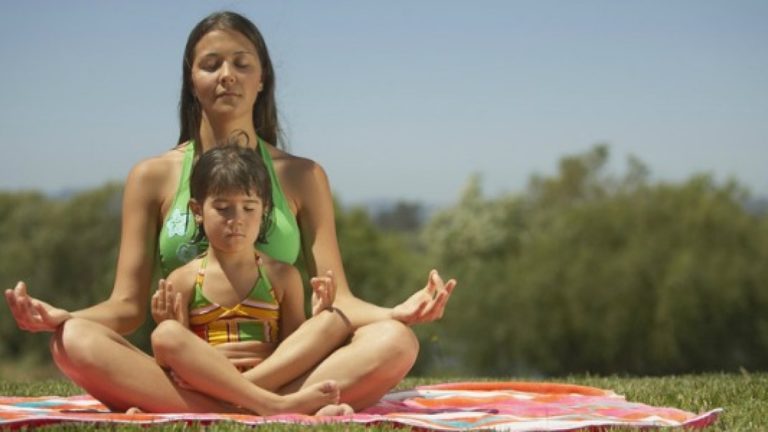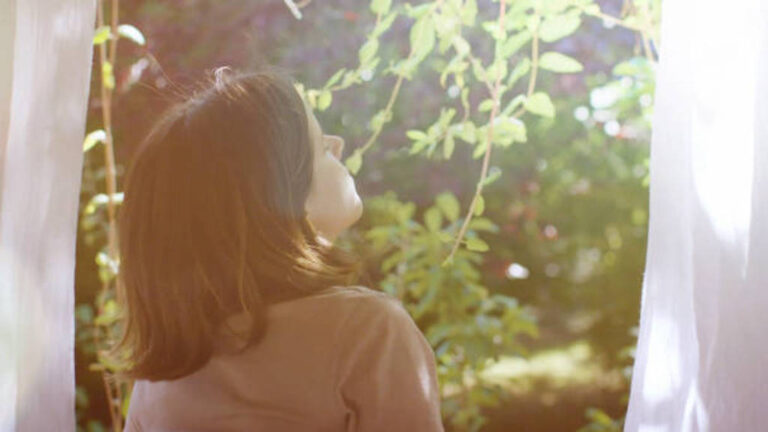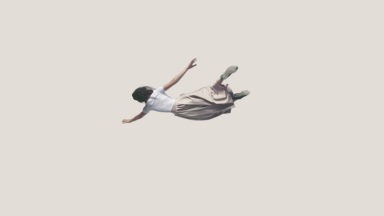Finding Your Power: A Guided Meditation for Kids

Most adults have heard about the benefits of meditation. We know that it’s recommended for heart health and to help alleviate the impact of stress. But we often overlook how powerful it can be for our children. The common thought is that kids have so much energy that the little jumping beans could never be still enough to meditate. But as a mother and a yoga teacher, I have seen this disproven again and again.
Just like grown-ups, kids need to clear their minds and process the stress they feel in their lives.
They may not be worried about paying bills or meeting deadlines, but their concerns are just as real. Recently, my 11-year-old son played in a soccer tournament. The boys on the team felt real pressure to perform well, to please their coach, and to think quickly on the field.
The first game didn’t go so well, leaving the boys slumping with disappointment, their postures signaling not only a defeated team, but defeated spirits. Kids can carry this wounded energy with them and relive their losses over and over, impacting their self-confidence and self-worth.
When we teach kids the tool of meditation, with a bit of yoga and breathing included, they start to learn that they can wipe the slate clean. They can get out of their heads and start fresh. Here is a meditation that will help your kids find their self-confident glow. And let’s face it: confidence leads to action, no matter what age you are.
FINDING POWER MEDITATION
Have them take deep breaths that fill their bellies and lungs. This breathing will start to shift them away from their troubles and disappointments. If your child is an athlete like mine, you may find it useful to mention the fact that athletes they admire, including Olympic stars, use a meditation practice similar to this. You can also add in simple yoga movements with core-firing motions, like rhythmic seated twists or sun breaths, to prep the body for stillness. Then guide them through the following visualizations and affirmations:
With eyes open and a soft gaze forward, sit with your ankles crossed and place the back of your left hand to your thigh while your other hand circles up overhead. As you slowly draw the hand in a straight line down (thumb side of the hand facing your face) the center of the forehead to the heart center, mentally say, “I am strong.”
Circle your arm back overhead slowly and as the hand draws a straight line down, mentally say “I am powerful.” Circle your arm back overhead slowly and as the hand comes down, mentally say “I am unafraid”.
Then, close your eyes and lie down. Resting the palms on the space right above the belly button, visualize that you have a bright light in the belly, and with each breath, the flame grows brighter like the sun. As you continue to breathe, imagine that sunlight starting to shine out to the limbs of your arms, the limbs of your legs, the space of the heart, and then the space of your mind. When you open your eyes, you will be clear and ready for whatever the day has in store for you. Take a deep breath in, and then exhale through the mouth, “Haaaah.” Eyes open and you are on your way.
There will be times when the Finding Power meditation is what your kids need, and other times when a visualization of the beach offers the relaxation they need to shift their mindset and clear stress.
With technology so readily available, kids often opt for quiet time in front of the TV or a video screen. If you can give them another option for quiet, you are giving them a tool that will help them achieve happiness throughout their entire life. Kids of all ages love peace and quiet; they just need a bit of guidance.
New Tool May Help Solve the Teen Mental Health Crisis

As rates of mental health issues in teens reach epidemic proportions, a new intervention that reframes the way they view stressors shows great promise in improving both psychological and physiological health.
Given the exponentially growing mental health crisis among teens, the American Academy of Pediatrics, along with several other medical organizations, recently declared a national emergency in children’s mental health.
While many societal factors are being implicated, researchers at the University of Rochester recently conducted a study that focused on the ordinary, day-to-day stresses that teens face, such as how they’re perceived by others.
Psychologist Jeremy Jamieson, who headed up the study, told the University of Rochester News Center, “For adolescents, social hierarchy, social comparisons, and peer evaluations have always been important, but now it’s there all the time… people are receiving a daily stream of likes, dislikes, and comments via social media, which makes for a constant state of social evaluation. it’s one of the most damaging things we’ve seen for adolescents.”
While these “social-evaluative stressors” can lead directly to depression and anxiety, it is how teens deal with them, experts say, that determines the psychological outcome.
While conventional thinking equates stress with something “bad,” Jamieson says, “stress is a normal and even defining feature of adolescence… for those of us who study processes and psychophysiology, stress is just any demand for change — it’s neither good nor bad.”





































